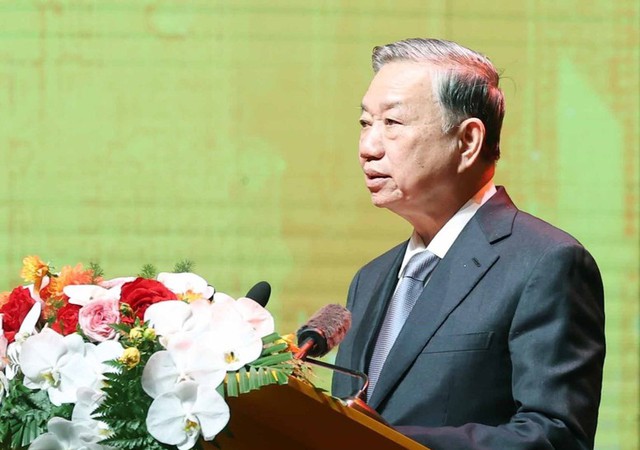Digital transformation-urgent requirement for Viet Nam to narrow development gap: Party chief
VGP - Digital transformation is not only an inevitable trend, but also an urgent requirement for Viet Nam to narrow the development gap with the region and the world.

General Secretary To Lam addresses the sixth annual national forum on the development of Vietnamese digital technology enterprises, Ha Noi, January 15, 2024 - Photo: VNA
General Secretary To Lam made the above statement while addressing the sixth annual national forum on the development of Vietnamese digital technology enterprises that opened in Ha Noi on January 15.
In his remarks, the Party chief noted that digital transformation not only opens up opportunities to improve labor productivity, but also creates conditions for innovation and enhances the quality of life for all people.
Meanwhile, digital transformation is a long-term strategic process that helps enhance national competitiveness and strengthen Viet Nam's position on the global economic map.
The total revenue of Viet Nam's digital technology industry was estimated to reach US$152 billion in 2024, an increase of 35.7 percent compared to 2019.
To expressed his delight to see the digital technology startup ecosystem growing stronger, with nearly 74,000 active enterprises. By the end of 2023, nearly 1,900 digital technology companies had expanded to international markets, with a revenue of US$11.5 billion, up 53 percent compared to 2022.
Thanks to numerous efforts to improve the quality of public administration and innovation, Viet Nam was ranked 71st out of 193 countries in terms of e-government development and 44th out of 133 countries in global innovation, reiterated the leader, adding that more than 1.67 million people are working in digital industry in Viet Nam.
Regarding major tasks ahead, the General Secretary called for doubling efforts towards technology self-reliance, and fostering the development of strategic and core technologies, as it is the foundation for building an independent and self-sufficient economy.
Viet Nam should enhance investment in research and development (R&D), especially in strategic technologies such as artificial intelligence (AI), the Internet of Things (IoT), big data, cloud computing, blockchain, nanotechnology, 5G and 6G mobile technologies, as well as space and satellite technologies.
To underscored the need to continue investing in the development of digital infrastructure as it plays a key role in driving the growth of the digital technology industry.
The government needs to pour more investments in modern, high-capacity, and high-bandwidth infrastructure that is synchronized and aligned with international standards, in order to facilitate nationwide connectivity and the development of the digital economy.
Policies should be put in place to attract high-tech talents, create an attractive working environment, support scientific research and innovation, thereby enhancing domestic capabilities and developing leading digital technology companies on the global stage.
To also emphasized the necessity of promoting the development of digital technology ecosystem with strong connections between businesses, universities, research institutes, and support organizations.
The Government should encourage public-private partnership initiatives, attract resources from businesses, investment funds, and international organizations to create diverse digital technology products and services for domestic needs and exports.
The Party chief called for gradually forming and developing digital economy sectors such as digital government, digital economy, and digital society while facilitating digital technology businesses to develop technological solutions applied to public administration, enhance the quality of public services, boost electronic transactions, and increase public access to information technology.
He stressed the need to improve tech capabilities and global competitive position. By 2030, Viet Nam will be among the top three leading countries in Southeast Asia in terms of digital technology research and development, while at least five large digital technology companies will be formed.
To also called for strengthening cooperation with leading global technology organizations and businesses, and attracting more digital technology research and production organizations to Viet Nam. Vietnamese businesses will be supported to participate in the global value chain and bring their digital technology products to international markets./.

